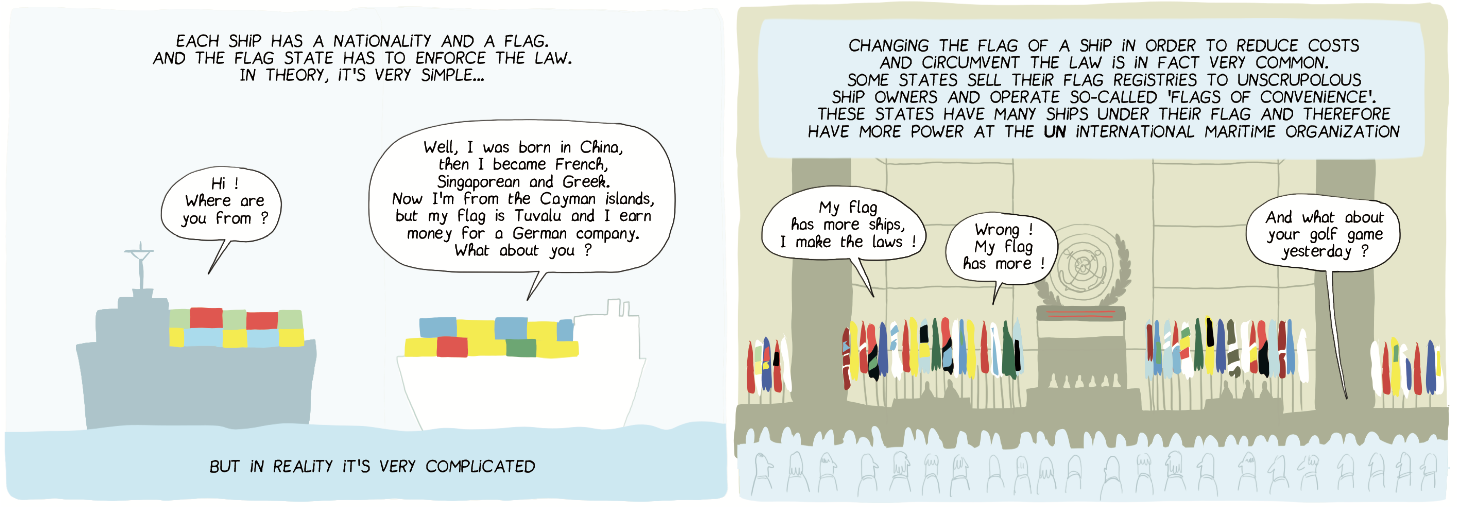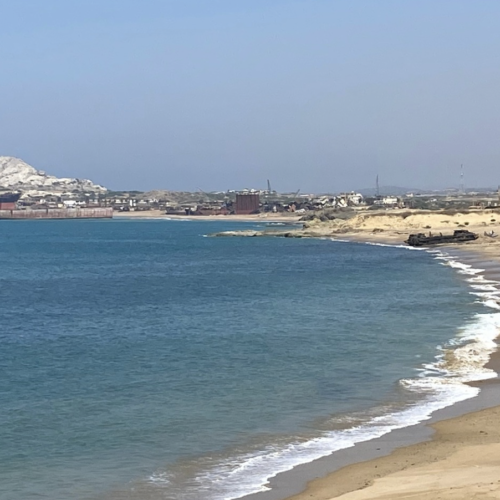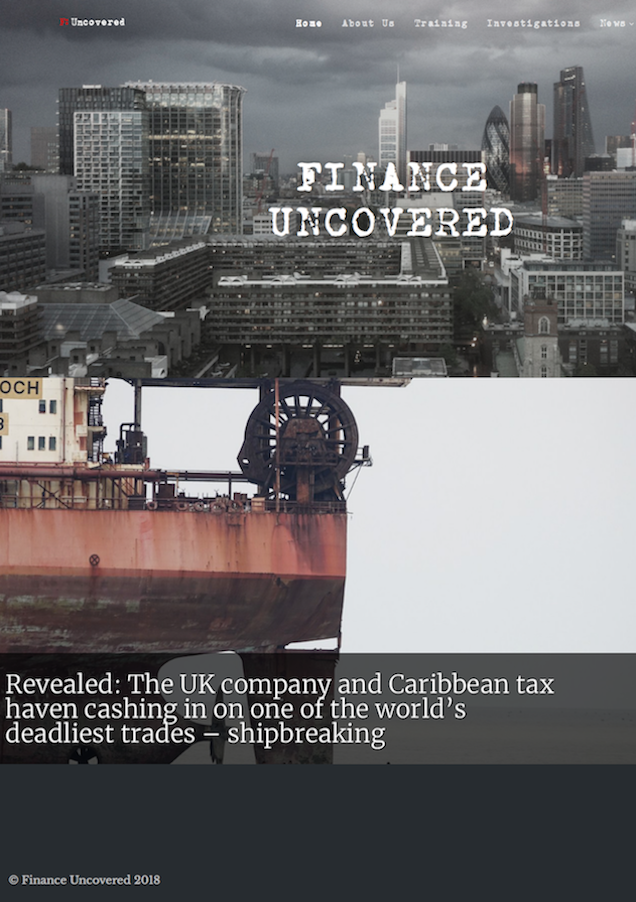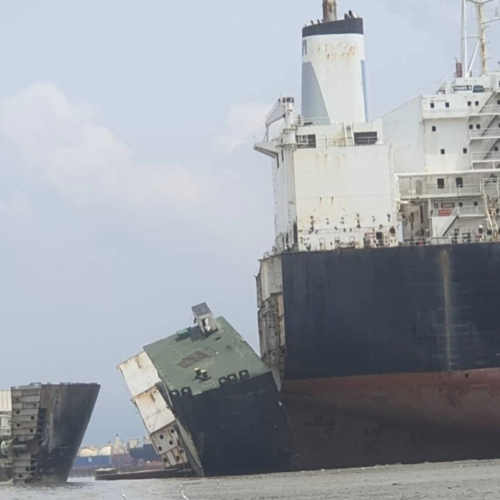Flags of Convenience
WHAT ARE THEY?
The United Nations Convention on the Law of the Sea (UNCLOS) provides for the primary responsibility for ships to rest with the vessel’s flag state. Thus, every merchant ship needs to be registered under the flag of a particular state under whose regulatory control it consequently falls. The flag state is, for instance, responsible for the inspection of the vessel and its seaworthiness, ensures safety and pollution prevention, and certifies the crew. As rights and obligations under international law are mainly imposed on to vessels via the flag states, they are a crucial factor in determining the enforceability of international standards.
As a general rule, there should be a “genuine link” between the country from where the ship is operated and the country of the flag under which it sails. Flag registries that do not have nationality requirements for the shipping companies that use their flag – often because they actually do not have any shipping companies incorporated – and that provide financial benefits, such as lower taxes, are commonly known as “flags of convenience” (FOCs). According to UNCTAD, almost 73% of the world fleet is flagged in a country other than that of the vessels’ beneficial ownership. Therefore, there is a huge discrepancy between the states in which ship owners are based and the flag states that exercise regulatory control over the world fleet. Indeed, whilst Greece, Japan, China, US and Norway were estimated amongst the top ship owning countries in 2018 – Panama, Marshall Islands and Liberia are by far the top three flag registries.
Despite exercising a public function, the FOC registries are in most cases not government agencies, but private companies situated outside the actual flag state or operating from different branch offices run by agents. Typically, the profits are shared between the company and the state of registration. FOCs compete for ship registration with policies that promise lower costs by keeping taxes, fees, and regulatory burdens light. Despite having ratified several international maritime and labour conventions, FOCs often lack the resources or the will to enforce international law effectively. Ship owners can easily and quickly change the flag of their ship and the practice of swapping the flag of a ship to reduce costs and avoid laws is referred to as “flag hopping”.

WHY IS FLAG STATE JURISDICTION A PROBLEM?
At the United Nations International Maritime Organisation (IMO), where all international maritime regulations are decided, the countries that have the largest number of ships under their flag have more weight in the decision-making process than those countries with fewer ships. All conventions adopted at the IMO only enter into force when a certain number of states that represent a certain percentage of the world fleet have ratified. Quite tellingly, the head of the Panama delegation at the IMO is therefore nicknamed “Mr. IMO”. Indeed, there are many small countries with no merchant shipping tradition or large shipping companies domiciled that have decisive power to influence international standards simply because many ships fly that country’s flag. At the IMO, ship owners in fact choose which states have power to regulate their industry.

FOCS AND SHIPBREAKING
For end-of-life vessels, the discrepancy between the countries of beneficial ownership and the ships’ flags is even higher than during the operational life of a ship. Certain FOCs are overrepresented at end-of-life; these FOCs are hardly used during the operational life of ships, but are particularly popular for the last voyages to the scrap yards. They are primarily used for ships that are beached in breaking yards in South Asia, rather than for ship recycling facilities elsewhere.
Over several years, we have analysed flag preferences at end-of-life and found that the flags of St Kitts and Nevis, Comoros, Palau and Tuvalu, and to a lesser extent Togo, Tanzania, St Vincent and the Grenadines, and Sierra Leone, which are less favoured flags during the operational life of the ships, are excessively popular flags for the end-of-life vessels broken in beaching facilities. These flags are all grey- or black-listed by the Paris Memorandum of Understanding (MOU), that is, these are flags known for their poor implementation of international maritime standards.
End-of-life registries such as St Kitts and Nevis, Comoros and Palau compete with each other by offering low-cost “last voyage” packages and expressly state that no nationality requirements need to be fulfilled in order to register under their flags – not even the setting up of a shell company. Typically, this includes fast-track registration procedures, valid only for a very limited period of time, at a special lower price. The popularity of certain end-of-life flags also varies over the years, with new end-of-life flags popping up every now and then.
Interestingly, an investigation for The Independent by Finance Uncovered recently revealed how a UK company is using a Caribbean tax haven (i.e. St Kitts and Nevis) to cash in on scrapping toxic ships on the beaches of South Asia.
WHICH SOLUTION?
Attempts to regulate ship recycling practices without obligations for ship owners beyond flag state jurisdiction and other incentives for clean and safe recycling will fail as reflagging to a non-party or non-compliant end-of-life flag, or selling the vessel to a cash buyer, who can do the same, remains an attractive solution for ship owners seeking to avoid stricter rules. Hazardous waste usually follows the path of least resistance – and backed by FOCs, ship owners will be able to continue choosing profits at the cost of people and the environment.
Regulation trying to improve ship recycling practices needs to look beyond flag state jurisdiction. The lack of political will at the international level to directly hold ship owners accountable or impose obligations on the states where ship owners are located has so far hindered any effective international solution to the shipbreaking problem, in particular the implementation of the polluter pays principle for ship owners. With the main obligation on flag states and shipbreaking countries with weak law enforcement, the Hong Kong Convention has not been able to create the incentives needed for a move towards safer and cleaner practices. Indeed, it was the industry itself, backed by flag states such as Panama and Marshall Islands that watered down efforts to hold ship owners accountable. Their aim was rather to rubberstamp current practices so as to allow continued profits.
At the European level, the establishment of a financial incentive which goes beyond flag state jurisdiction and covers all ships calling at European ports could direct more end-of-life vessels towards modern ship recycling facilities and thus provide the necessary incitement for investments in safer and cleaner ship recycling methods world-wide.
RECOMMENDED READINGS
Latest News

Platform publishes South Asia Quarterly Update #43
Fifteen workers suffered an accident on South Asian beaches in the third quarter of 2025.
... Read More




